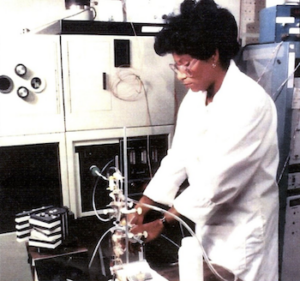
Winifred Burks-Houck
*Winifred Burks-Houck was born on this date in 1950. She was a Black environmental organic chemist and environmental justice advocate.
Winifred Burks was born in Anniston, Alabama, to parents Matthew Burks and Mary Emma Goodson-Burks. She was the great-granddaughter of abolitionist Harriet Tubman. Education Burks began her education in Anniston, having attended elementary and high school in the city. She earned a Bachelor of Arts degree in chemistry from Dillard University, followed by a Master of Science Degree in Organic Chemistry from Atlanta University. She pledged as a Delta Sigma Theta Sorority member as an undergraduate at Dillard University.
After graduation, she remained a loyal member of the San Francisco-Peninsula Alumnae Chapter of the sorority to continue their community advocacy and activism mission. During this time, she married Morris Houck. Burks-Houck began her professional career in 1983 as an environmental chemist at the Lawrence Livermore National Laboratory, working on environmental protection projects interested in ensuring worker safety. In 1993, Burks-Houck became the first female president of the National Organization for the Professional Advancement of Black Chemists and Chemical Engineers (NOBCChE) until 2001.
Her involvement was credited with a more than 100% increase in student and professional chapters, instituting new scholarships through public and private entities, updating telephone and computer systems at the National Office, and establishing the Science Quiz Bowl and the Science Fair at the National level. Burks-Houck was dedicated to establishing the NOBCChE on the West Coast and its national endeavors. She was invited to Dakar, Senegal, to represent NOBCChE as an environmental chemist and deliver a presentation titled: "Environmental Applications and Regulatory Reporting."
She served as the first chair of the San Francisco Bay Area Chapter from 1984 – 1990, organizing educational and professional development events for the community. Burks-Houck built partnerships with other organizations such as the American Association for the Advancement of Science (AAAS), American Chemical Society (ACS), American Indian Science and Engineering Alliance, National Aeronautics and Space Administration (NASA), and the Society for the Advancement of Chicanos and Native Americans in Science (SACNAS).
Winifred Burks-Houck died on May 6, 2004. Her legacy with the NOBCChE was expanded upon in 2010, after her death, through the creation of the Winifred Burks-Houck Professional Leadership Awards and Symposium to honor the contributions of African American women in science and technology. There are four categories of awards: Distinguished Lecturer, Professional Awardee, Graduate Student Awardee, and Undergraduate Awardee to recognize scientific achievements, creativity, leadership, and community service.